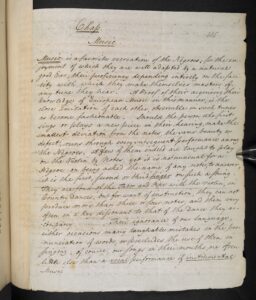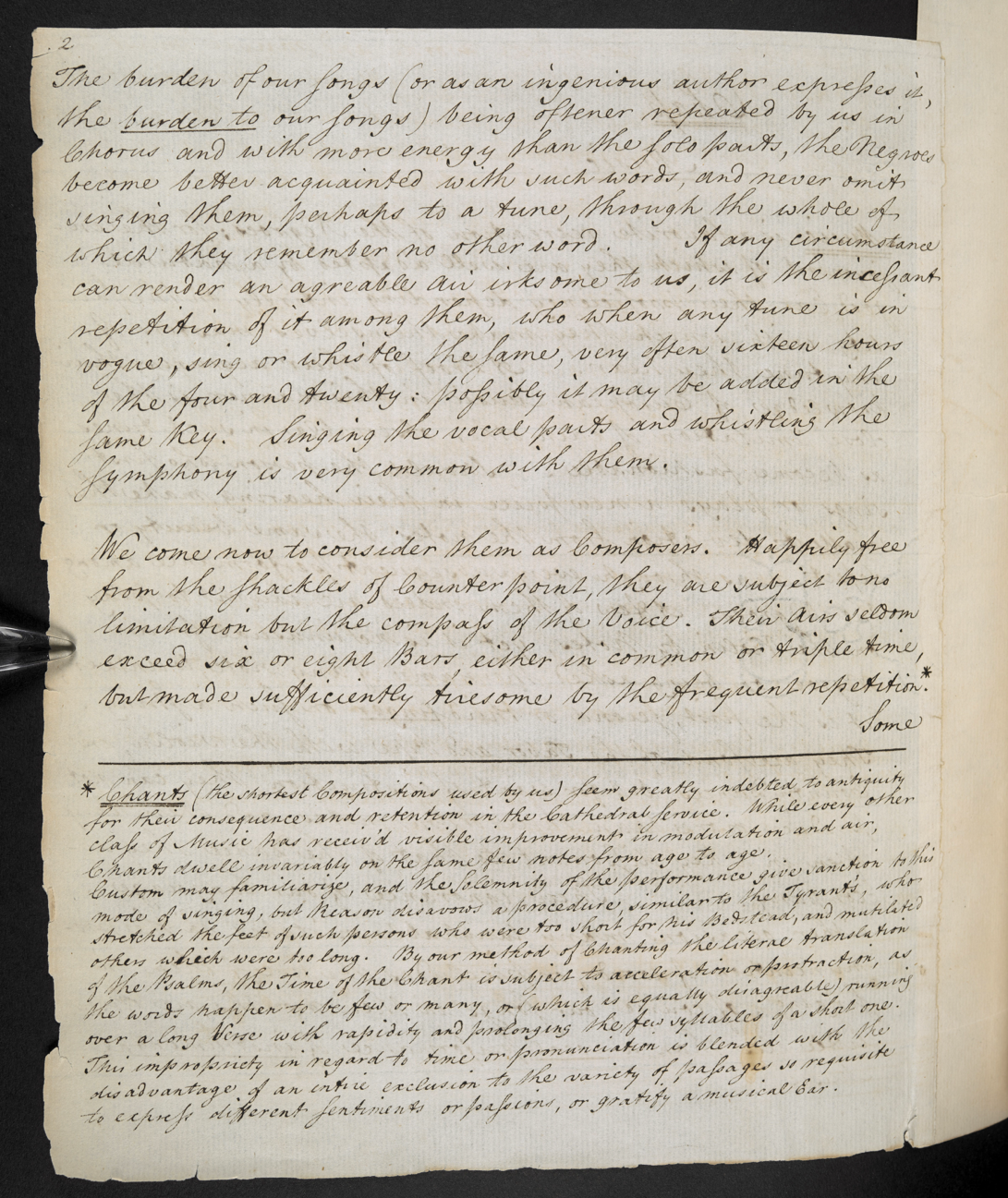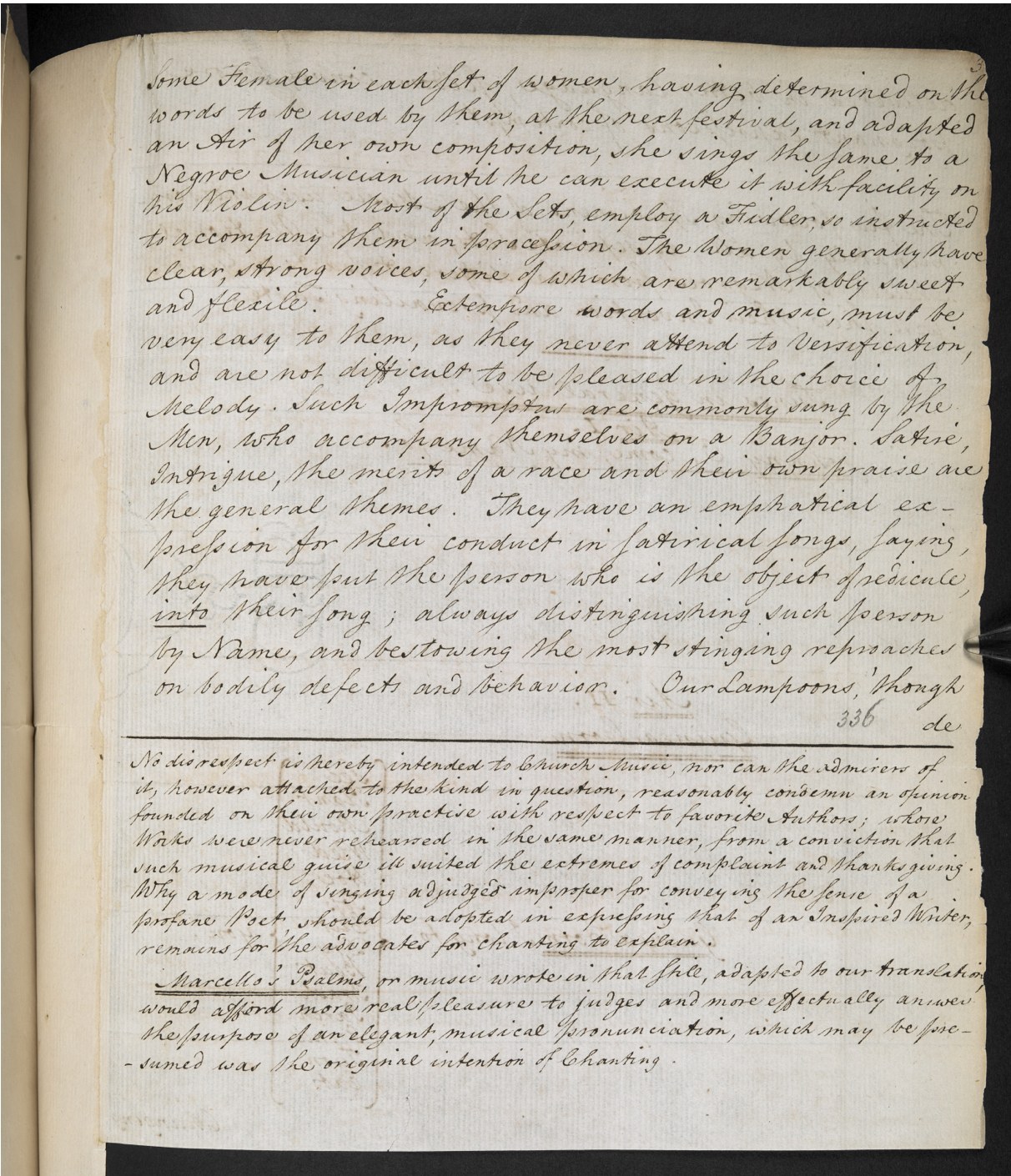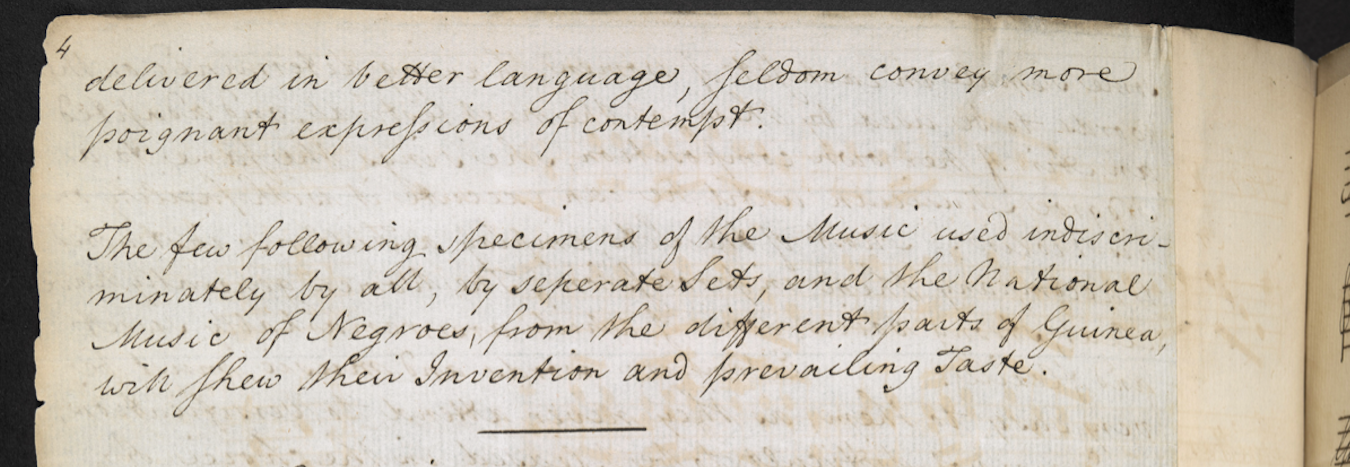Author's Notes on Music

Folio 335r
Chap.
Music.
Music is a favorite recreation of the Negroes; for the enjoyment of which they are well adapted by a natural good ear; their proficiency depending entirely on the faculty with which they make themselves masters of any tune they hear. A proof of their acquiring their knowledge of European music in this manner, is the close imitation of each other, observable in such tunes as become fashionable. Should the person who first sings or plays a new piece in their hearing, make the smallest deviation from the notes, the same beauty of defect, runs through every subsequent performance among the Negroes. A few of them indeed are taught to play on the violin by notes, yet it is not unusual for a Negroe on being asked the name of any note, to answer, it is the first, second or third finger on such a string. They are fond of the Tabor and Pipe with the violin, in Country Dances, but for want of instruction, they cannot produce more than three or four notes, and them very often in a key dissonant to that of the Dance they accompany. Their ignorance of our language, either occasions many laughable mistakes in the pronunciation of words, or precludes the use of them in singing; of course, our songs in their mouths, are often little else than a vocal performance of instrumental music.

Folio 335v
The burden of our songs (or as an ingenious author expresses it, the burden to our songs) being oftener repeated by us in chorus and with more energy than the solo parts, the Negroes become better acquainted with such words, and never omit singing them, perhaps to a tune, through the whole of which they remember no other word. If any circumstances can render an agreeable air irksome to us, it is the incessant repetition of it among them, who when any tune is in vogue, sing or whistle the same, very often sixteen hours of the four and twenty: possibly it may be added in the same key. Singing the vocal parts and whistling the symphony is very common with them.
We come now to consider them as composers. Happily free from the shackles of counterpoint, they are subject to no limitation but the compass of the voice. Their airs seldom exceed six or eight bars, either in common or triple time, but made sufficiently tiresome by the frequent repetition.*
__________________________________________________
*Chants (the shortest compositions used by us) seem greatly indebted to antiquity for their consequence and retention in the cathedral service. While every other class of music has received visible improvement in modulation and air, chants dwell invariably on the same few notes from age to age. Custom may familiarize, and the solemnity of the performance give sanction to this mode of singing, but reason disavows a procedure similar to the tyrants’, who stretched the feet of such persons who were too short for his bedstead, and mutilated others which were too long. By our method of chanting the literal translation of the Psalms, the time of the chant is subject to acceleration or protraction, as the words happen to be few or many, or (which is equally disagreeable) running over a long verse with rapidity and prolonging the few syllables of a short one. This impropriety in regard to time or pronunciation is blended with the disadvantage of an entire exclusion to the variety of passage so requisite to express different sentiments or passions, or gratify a musical ear.

Folio 336r
Some female in each set of women, having determined on the words to be used by them, at the next festival, and adapted an air of her own composition, she sings the same to a Negroe musician until he can execute it with facility on his violin. Most of the sets, employ a fiddler, so instructed to accompany them in procession. The women generally have clear, strong voices, some of which are remarkably sweet and flexile. Extempore words and music, must be very easy to them, as they never attend to versification, and are not difficult to be pleased in the choice of melody. Such impromptus are commonly sung by the men, who accompany themselves on a Banjor. Satire, intrigue, the merits of a race and their own praise are the general themes. They have an emphatical expression for their conduct in satirical songs, saying, they have put the person who is the object of ridicule into their song; always distinguishing such person by name, and bestowing the most stinging reproaches on bodily defects and behavior. Our Lampoons, though
__________________________________________________
*No disrespect is hereby intended to church music, nor can the admirers of it, however attached to the kind in question, reasonably condemn an opinion founded on their own practice with respect to favorite authors; whose works were never rehearsed in the same manner, from a conviction that such musical guise ill suited the extremes of complaint and thanksgiving. Why a mode of singing adjudged improper for conveying the sense of a profane poet, should be adopted in expressing that of an inspired writer, remains for the advocates for chanting to explain.
Marcello’s Psalms, or music wrote in that style, adapted to our translation, would afford more real pleasure to judge and more effectually answer the purpose of an elegant, musical pronunciation, which may be presumed was the original intention of chanting.

Folio 336v
delivered in better language, seldom convey more poignant expressions of contempt.
The few following specimens of the music used indiscriminately by all, by separate sets, and the national music of Negroes, from the different parts of Guinea, will show their invention and prevailing taste.
Images © British Library Board (C.E. Long Papers, Add. MS 12405, ff. 335r-341v).
